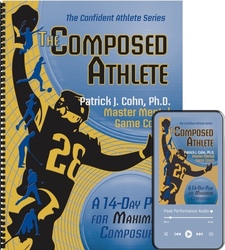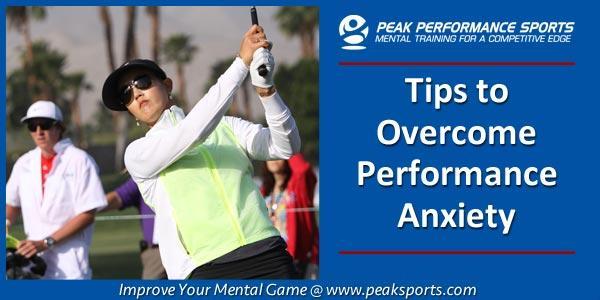Managing Competitive Anxiety
Anxiety and worry are the biggest performance problem for young competitive athletes.
Anxious athletes report the following:
–“I play so well in practice but mess up in games.”
–“I’m so nervous in games that I get sick to my stomach.”
–“I become so anxious in competitions that I can’t concentrate.”
–“I always fall apart when the game is on the line.”
–“I get so nervous that I don’t even enjoy my sport anymore.”
Performance anxiety wears on athletes, which can create a host of negative physical and mental issues that can hurt your performance.
Do you or your athletes experience physical changes, such as racing heart beats, difficulty breathing, tight muscles, upset stomach, jumpiness and an inability to produce smooth or fluid mechanics?
While the physical symptoms are difficult enough to deal with, it’s the mental worry that triggers the physical changes.
Negative thinking, fear of failing, inability to deal with adversity or uncertainty, problems with focusing and the overwhelming need to be perfect are the mental trigger that can lead to performance anxiety.
To make matters worse, athletes often stress our over their inability to manage the choking response.
These young athletes feel isolated and believe themselves to be the only ones negatively affected by anxiety.
Truth be told, even Olympic and professional athletes can become overwhelmed by anxiety.
Graham DeLaet, a 34 year-old golfer and seven-year PGA Tour veteran, felt so nervous chipping and pitching while preparing for the 2016 Memorial Tournament that he withdrew from the event and took a break from competing in tournaments.
DeLAET: “A lot of fear standing over chips shots for whatever reason. I mean it’s something I’ve never really been through in my entire career.”
DeLaet had been playing golf for 22 years and never experienced such paralyzing anxiety.
DeLAET: “I’ve been playing golf since I was 12 years old and this is kind of a strange thing, but I’m working through it right now.”
DeLaet decided to work with a sport psychologist and seems to be getting back on track mentally.
DeLAET: “I’m getting better all the time and I know that it might just take one good shot under pressure to know that it’s in there and kind of change that confidence level. The rest of my game has been really, really good and I’m optimistic that I’m going to turn it around.”
DeLaet is proof that athletes can learn mental strategies to cope with anxiety and perform confidently.
To help you overcome anxiety and fear, you can’t just do relaxation training. This is simply a band aid and does not address the real issue, which I find is often related to fear of failure.
Tips for managing competitive anxiety:
Underneath the tension and worry you feel is something else you might NOT be aware of, such as the fear of embarrassment.
To overcome performance anxiety:
1. Understand what the ultimate fear is all about. Are you afraid to disappoint others, for example?
2. Challenge the rationality of your fear. What’s so important about it?
3. Learn how to embrace competition pressure rather than fear you will fail or feel disappointed.
4. Understand the reason you put in hours per week of training is to have fun and trust your skills in competition!
Check out our Video of The Week:
This week, Dr. Cohn helps parents and coaches understand the problems with trying to perform perfectly:
Sports Parents Success Video 7: Athletes Who Try to be Perfect
Related Sports Psychology Articles
- Overcoming Pressure and Anxiety in Matches
- How to Manage Anxiety in Competitions
- How to Overcome Tension and Anxiety
*Subscribe to The Sports Psychology Podcast on iTunes
*Subscribe to The Sports Psychology Podcast on Spotify
Download a free sports psychology report to improve your mental game!
Learn more about our one-on-one mental game coaching.
The Composed Athlete

“The Composed Athlete” is presented on 80-minute Audio Programs with a 70-page step-by-step workbook that guides you through the program each day. It’s a complete system for conditioning your mind to have maximum composure in competition.
“The Composed Athlete” was developed for any level coach, parent, or junior to professional athlete who wants to improve performance and gain a competitive edge. It does not matter if you are a fledgling junior athlete; or a seasoned professional, plagued with distractions; or you just wanting to learn how to improve your composure…


